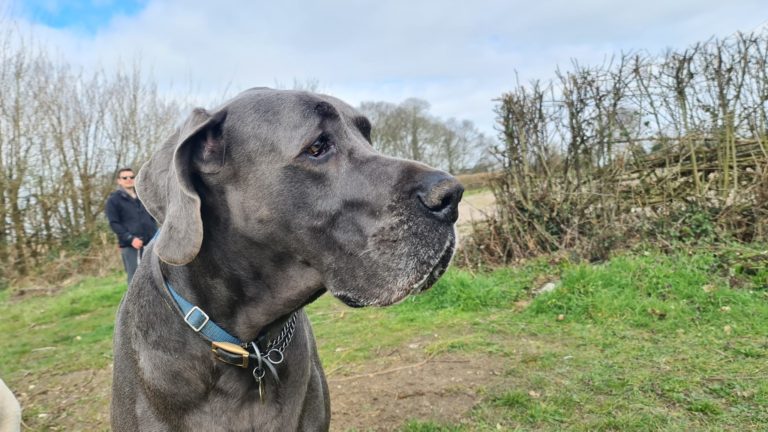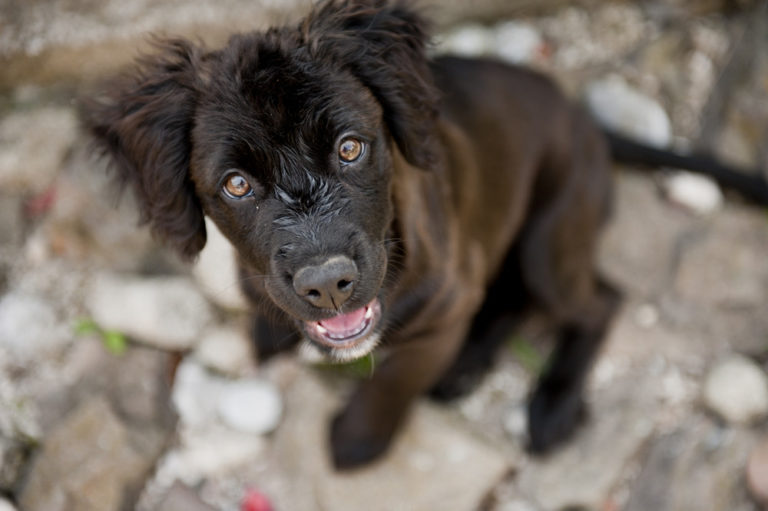How to stop car sickness in dogs – avoid the stress and the mess!
It’s a warm sunny day, so you’ve hopped in the car with your dog to go to the park.
Suddenly, your dog doesn’t look so good, and before you know it his breakfast has spewed unceremoniously all over your back seat 😯
This isn’t good for you, your car, and especially isn’t good for your dog, so let’s take a look at how to stop car sickness in dogs (and also cats!)
About car sickness in dogs (and other pets)
Pet motion sickness and travel anxiety is an all too familiar story and in extreme cases it can severely limit the experiences that we can enjoy with our dogs.
A crazy statistic for you – according to the (very longwinded) canine noise aversion and motion sickness research report, from December 2018, car sickness affects as many as 48% of dogs!
What car sickness in dogs means for us:
- No more hiking weekends away with your four legged friend.
- No more trips to the beach (unless you’re lucky enough to be within walking distance).
- An unhappy dog whenever we need to take them anywhere in the car, or the veterinarian (which can be a double whammy for your poor anxious dog).
It’s not only dogs that can experience motion sickness and travel anxiety; our cats, rabbits, hamsters and even birds can suffer too.
And while we may not be taking our cat for jaunts to the beach, there are times when travel in a vehicle is unavoidable and can cause unnecessary stress.
Fortunately, there are some simple things you can do – both for short-term alleviation of motion sickness and longer-term behavioral actions – to help reduce travel anxiety in your dog or pet.
We’ll get into those as we delve further into car sickness in dogs, but let’s start with the basics – what are the symptoms other than the obvious vomiting?
Firstly, what are the symptoms of travel anxiety and motion sickness?
While motion sickness can result in that most noticeable of symptoms – vomiting, there are several other signs your dog is suffering car sickness or travel anxiety.
All of which are unpleasant for you and your pet:
- Agitation
- Panting
- Excessive salivation
- Trembling
- Barking or mewing
- Whining or scratching
- Urinating or soiling
- Attempting to escape
- Vomiting
What causes travel anxiety and car sickness in dogs?
There are a few reasons which cause car sickness in dogs, the most common being during the puppy phase.
Let’s consider three of the main reasons:
Car sickness in puppies
Car sickness in dogs is more common in puppies and young dogs rather than older dogs, just as car sickness affects children more than adults.
This is because the ear structures used for balance aren’t yet fully developed in puppies and children.
Many puppies thankfully outgrow travel sickness as they mature, but not all of them will.
If the first few car rides of your puppy’s life leave him nauseated, he may have been conditioned to equate travel with vomiting.
Our dogs tend to associate a single bad experience to a feeling like nausea, which is why it’s common for those experiences as puppies to stick with them even when their ears are fully matured.
It only takes one bad experience for your dog for them to develop long term car sickness.
Car sickness caused by anxiety – a fear of the destination
You probably already know a single negative experience can stick with your dog for a very long time, and even prove hard to resolve with training or even a canine psychologist.
A common example with our dogs is a single negative experience at the vets, groomers, or a boarding kennel.
Your dog’s smart enough in most instances to know where they’re going when they get in the car, and this can cause anxiety.
So the anxiety may be less about the car itself and more about the destination, and this anxiety leads to car sickness in your dog.
Other (less common) triggers of car sickness in dogs
Sometimes something specific may also trigger your dog’s anxiety and car sickness.
For example the sound the car makes when you drive over rumble strips, or large lorries passing by on the highway.
These triggers are much harder to diagnose and deal with, as it’s likely we’re simply not aware of what those triggers are for your dog, or why they’ve become a trigger.
Sometimes your dog may become car sick when you take a different route to your usual jaunt to the park.
How do we prevent car sickness in dogs?
If your dog is still young, in the puppy phase, you may find their car sickness gets better as they grow older.
Otherwise, let’s address a few ways to prevent car sickness in dogs:
Simple first steps
One simple thing to do is keep your dog from looking out the window.
This might seem contrary to common sense, as we humans tend to wind down the window to get some fresh air if we are feeling car sick.
Depending on the laws around pets in the car in your area, the front foot well of the car is actually the best location to stop your dog feeling car sick.
If your dog is traveling in a crate that can fit in this area it’s closest to the lowest point of the car, which moves the least, therefore has the least motion.
It can also help to try a variety of alternative methods to calm your pet.
For example, speak to her in a calm, soothing voice, bring her favourite toy along for the ride or you may find that playing some classical music on the radio may help to soothe her nerves.
Addressing car sickness with a canine psychology approach
If your dog suffers from extreme travel anxiety, a longer term behavioral approach may be required.
Seeking the help of a local dog behavior expert might be well worth doing if you plan to travel a lot with your dog. They would assess your dog, hopefully figure out the cause of the car sickness, and offer you a plan to resolve it.
An example of such a plan may be as follows:
Start with the car parked and go into the back seat (or cargo area) with her, pet her, praise her, and give her treats.
Do this for just a few minutes at first, or even just a few seconds (depending on how stressed she is).
Do this daily, or every other day, for a couple of week while gradually increasing the amount of time you’re spending in the car.
Once your dog is as comfortable spending a little time in a parked car, the next stage is to take her on a short journey, followed by a reward.
Gradually build up the length of journey to desensitize her to the motion and stress of travel and when you feel she is ready, add in a fun destination so she can start to associate the car with going somewhere enjoyable.
What about Benadryl for car sickness in dogs?
While there are conventional pharmaceuticals available, just as there are for humans who experience travel sickness, these should only be used in extreme circumstances and under the direction of your vet.
It’s always better to avoid such medications, such as Benadryl, as they can be sedating and have side effects. Sometimes though, it may be the only way.
Benadryl is an antihistamine which helps relieve symptoms of car sickness in your dog, including vomiting and drooling. It comes in both liquid and pill form, and you can give it to your dog either orally or by injection.
Important – You should always check with your veterinarian who will advise you and check it is safe for your dog based on breed, age, and condition. Always follow the dosage instructions, and never give a dog more than the recommended dose.
Acupressure for car sickness
Acupressure can also help to alleviate nausea and anxiety.
There’s a pressure point located behind and above the carpus – the dog equivalent of the wrist. But it’s essential to receive expert advice from a pet care professional to ensure this is done correctly and without stress to your pet.
Travel anxiety medicines (including homeopathic)
Another safe and effective way to help alleviate motion sickness and fear of travel is travel anxiety medicines.
These are usually simple to administer liquid drops, non-sedating, and contain only safe ingredients with no side effects.
Generally these medications, which are often available in a variety of brands at pet stores or online, aren’t as effective as Benadryl, but may help reduce the car sickness in your dog.
These homeopathic alternatives may contain a variety of ingredients believed to help travel anxiety, with examples being borate of sodium, meadow saffron, valerian root, or cocculus indicus.
Let’s take a brief look:
- Borate of Sodium – a pre-eminent medicine that helps reduce the startling effect of sudden noises.
- Meadow Saffron – to help alleviate motion sickness.
- Valerian Root – this can have a calming effect on the over-excitement associated with travel.
- Cocculus Indicus – for the effects of motion sickness from a disturbance of the balance mechanism.
- Passion Flower – believed to help calm the fear induced by the effects of traveling.
Common questions about car sickness in dogs
For completeness, let’s take a look at some of the most common questions about car sickness in dogs:
Do dogs outgrow car sickness?
Young dogs, especially puppies, are often car sick as their ears and balance hasn’t fully matured. Usually they will outgrow car sickness by the age of 20 weeks unless an anxiety develops which continues to trigger car sickness.
What makes dogs car sick?
There are three main causes – (1) undeveloped ears in puppies causes nausea when travelling, (2) an anxiety of travel, or (3) a fear of destination, such as a veterinarian, groomer, or boarding kennel.
How to prevent dog car sickness?
There are four ways to prevent car sickness in dogs – (1) a puppy or young dog may outgrow car sickness naturally, (2) using simple methods such as letting them sit in the front footwell or offering calming reassurance, (3) addressing anxiety and aspects of dog behavior, or (4) using a medication such as Benadryl with advice from your veterinarian.
Should I medicate a dog before flying (domestic or overseas)
Generally it’s not recommended to medicate a dog before flying unless your dog is particularly anxious. Pet transport companies like Jetpets will advise you against it, unless your veterinarian has specifically recommended it.






